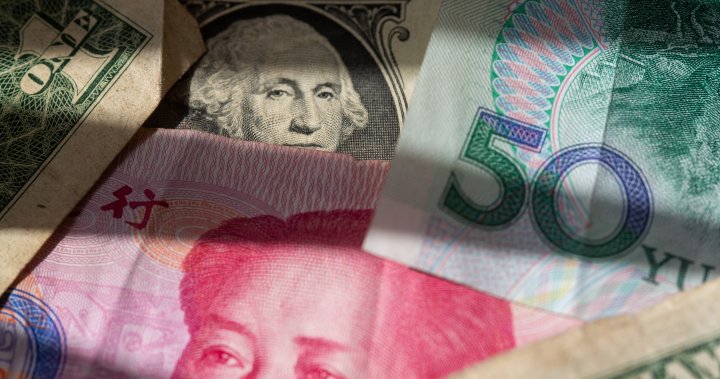The trade war is rocking economies. Get your ‘houses in order,’ IMF urges – National

As the International Monetary Fund (IMF) projects slower growth and higher inflation for some countries, the organization’s head has a stark warning to all countries: get your “houses in order.”
The warning by managing director Kristalina Georgieva comes as the IMF is set to release its World Economic Outlook next Tuesday, which she said will show that though there will be “notable markdowns” in growth, there won’t be a recession.
That doesn’t mean, however, that countries won’t face difficulties.
“All countries must redouble efforts to put their own houses in order,” she said in the text of her speech in the U.S on Thursday. “In a world of higher uncertainty and frequent shocks, there is no room for delay in reforms to enhance economic and financial stability and improve growth potential.”
The comments come three months into the second term of U.S. President Donald Trump, whose protectionist policies and widespread tariffs have rocked world markets and spurred concerns of a potential global recession.

Georgieva’s remarks noted the issues that have come in recent months.

Get daily National news
Get the day’s top news, political, economic, and current affairs headlines, delivered to your inbox once a day.
Namely, she said “uncertainty is costly,” saying the cost of one item can be impacted by tariffs in dozens of countries and lead to the postponement of investment decisions, volatility in financial markets, and even questions about which ports ships should sail to.
She went on to say that protectionism “erodes productivity over the long run, especially in smaller economies.”
“Ultimately, trade is like water: when countries put up obstacles in the form of tariff and nontariff barriers, the flow diverts,” she said. “Some sectors in some countries may be flooded by cheap imports; others may see shortages. Trade goes on, but disruptions incur costs.”
Amid the uncertainty, Georgieva urged countries to adjust fiscal policies in order to lower debt levels when necessary, while also keeping their monetary policies “agile and credible.”
In the past weeks since Trump’s latest round of tariffs have come into force, some central banks have appeared to take a wait-and-see approach.
The Bank of Canada on Wednesday did not lower its benchmark rate, keeping it at 2.75 per cent, with the Bank saying in a statement that the major shift in U.S. trade policy and tariff unpredictability prompts increased uncertainty, diminished prospects for economic growth and raised inflation expectations.
U.S. Federal Reserve chair Jerome Powell also said in remarks on Wednesday that it would likely need to pause before lowering interest rates further amid concerns over inflation and tariff impacts.
The Bank of England last week also warned that Trump’s import tariffs have increased the risks of a hit to the global economy.

Georgieva said a second “hugely important priority” is that countries should renew focus on correcting internal and external macroeconomic imbalances, though she acknowledged it can be difficult.
The IMF director went on to recommend that the three “largest actors” — China, the European Union and the U.S. — take their own actions.
With China, the IMF recommended the country dial back its industrial policies and “pervasive state involvement” in industry, while boosting “chronically low” private consumption.
While the IMF notes the U.S. economy has seen strong productivity growth, it must work on putting its federal government debt on a “declining path,” which Georgieva says will require significant reductions to the deficit.
She also said the EU should focus on “assertive fiscal expansion” by Germany to facilitate defence and infrastructure spending, while as a whole the bloc must improve competitiveness by “deepening the single market.”
Georgieva says resilience is being tested by a “reboot” of the global trading system and work must be done on trade policy.
“The goal must be to secure a settlement among the largest players that preserves openness and delivers a more-level playing field — to restart a global trend toward lower tariff rates while also reducing nontariff barriers and distortions,” she said.
“We need a more resilient world economy, not a drift to division.”
— with files from Global News’ Uday Rana and The Associated Press
© 2025 Global News, a division of Corus Entertainment Inc.








